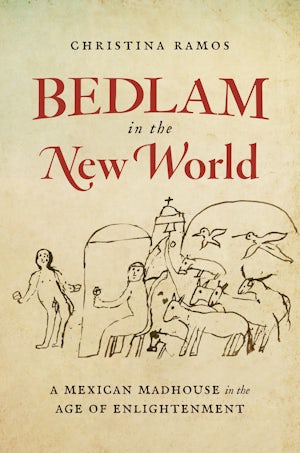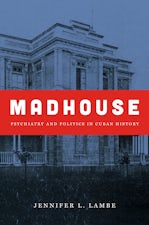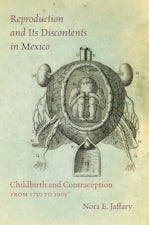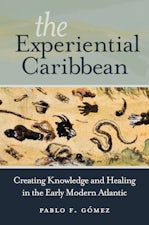Bedlam in the New World
A Mexican Madhouse in the Age of Enlightenment
By Christina Ramos
266 pp., 6.125 x 9.25, 12 halftones, 5 tables
-
Paperback ISBN: 978-1-4696-6657-0
Published: March 2022 -
Hardcover ISBN: 978-1-4696-6656-3
Published: March 2022 -
E-book EPUB ISBN: 978-1-4696-6658-7
Published: December 2021 -
E-book PDF ISBN: 979-8-8908-6109-2
Published: December 2021
Buy this Book
- Paperback $34.95
- Hardcover $95.00
- E-Book $26.99
For Professors:
Free E-Exam Copies
Awards & distinctions
2022 Berkshire Conference of Women Historians Book Prize (Non Women & Gender Category)
2023 Philip Pauly Prize, History of Science Society
2023 Cheiron Book Prize, Cheiron, the International Society for the History of Behavioral and Social Sciences
2022 Bandelier/Lavrin Book Prize, Rocky Mountain Council for Latin American Studies
Honorable Mention, Alfred B. Thomas Book Award, Southeastern Council of Latin American Studies
Shortlisted, 2023 Kenshur Prize, Center for Eighteenth-Century Studies
Honorable Mention, María Elena Martínez Prize, Conference on Latin American History
Christina Ramos reconstructs the history of this overlooked colonial hospital from its origins in 1567 to its transformation in the eighteenth century, when it began to admit a growing number of patients transferred from the Inquisition and secular criminal courts. Drawing on the poignant voices of patients, doctors, friars, and inquisitors, Ramos treats San Hipólito as both a microcosm and a colonial laboratory of the Hispanic Enlightenment—a site where traditional Catholicism and rationalist models of madness mingled in surprising ways. She shows how the emerging ideals of order, utility, rationalism, and the public good came to reshape the institutional and medical management of madness. While the history of psychiatry’s beginnings has often been told as seated in Europe, Ramos proposes an alternative history of madness’s medicalization that centers colonial Mexico and places religious figures, including inquisitors, at the pioneering forefront.
About the Author
Christina Ramos is assistant professor of history at Washington University in St. Louis.
For more information about Christina Ramos, visit
the
Author
Page.
Reviews
"Sharp, wonderfully analysed and researched, and delightfully written. . . . Ramos’ incisive historiographical interventions are supported by her outstanding source base."—Social History of Medicine
"A triumph . . . eloquent, provocative, highly synthesized, and compellingly theorized. Its brisk and accessible prose will lead to successful discussions with advanced undergraduates . . . [and will] doubtlessly be essential reading for historians of pre-modern histories of medicine, the behavioral and mind sciences, colonial histories of medicine, and colonial Latin American history."—Journal of the History of the Behavioral Sciences
“A compelling study of the medicalization of madness. . . . Ramos provides a model of scholarship that will appeal to a wide range of scholars interested in histories of medicine.”—H-Sci-Med-Tech
"A welcome addition to the literature on colonial medicine in Spanish America. It builds on the work of María Cristina Sacristán while uncovering the institutional transformation of a unique site. . . . concise, clearly written, and well researched."—Reading Religion
"Ramos’s work will be of particular interest to scholars of religion and law, offering as it does evidence not only for reading colonies as ‘laboratories of modernity’ but legal archives as rich sources of such (multivalent, often ambiguous) work."—Religious Studies Review
“Ramos encuentra una justificación novedosa para estudiar la locura en esta etapa de grandes cambios. La originalidad de su libro también radica en el fino análisis documental y hermenéutico que realiza para mostrar rompimientos y continuidades en un proceso de transición de modelos.”
“[Through Bedlam in the New World] Ramos demonstrates a new reason to study madness in an era of substantial change. The originality of her work lies in her fine-tuned documental and hermeneutic analysis that reveals the breaks and continuities in a process of changing models.”–Hispanic American Historical Review




